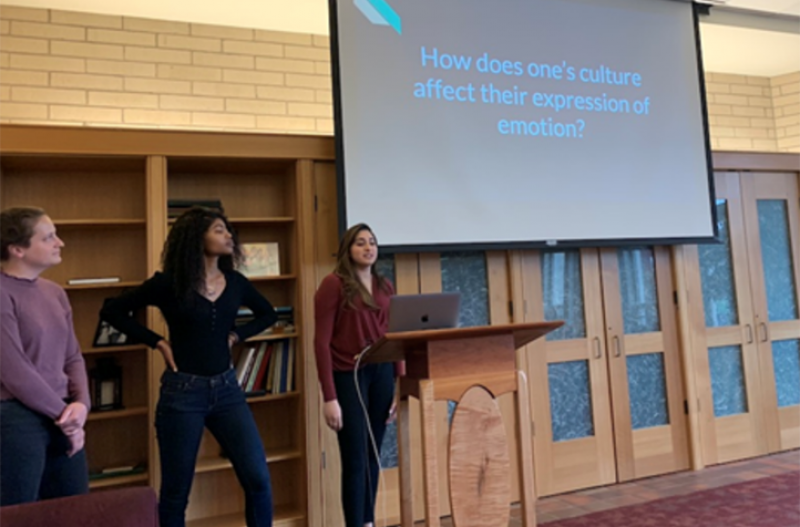Bridging Learning and Doing
A class in DU's Psychology Department partnered with a public school in northeast Denver to gain and share critical knowledge.

This spring, junior and senior psychology students in Associate Professor Kateri McRae’s Emotion Regulation class worked to do something that scientists and journalists constantly struggle with — communicating scientific results to a non-specialized audience. The class focused on emotion regulation, which refers to all the ways that we might attempt to change our own (or someone else’s) emotions to be more in line with our goals.
Emotion regulation is a popular topic of research, and hundreds of studies have identified the different strategies that we use to regulate our emotions, the consequences of using one strategy rather than another, the cultural factors that might change those consequences and interventions that might improve emotion regulation.
The ultimate goal of the class was to have the students prepare presentations that quickly communicated the main take-home point of a recent study published in a peer-reviewed journal. The studies covered topics such as the relationship between emotion regulation strategies and mental illness, and contexts in which people might want to engage in the up-regulation of negative emotions such as anger.
To do this, the Emotion Regulation class partnered with a psychology class from High Tech Early College (now Northeast Early College), a public school in northeast Denver that primarily serves students from minoritized groups. Professor McRae and Courtney Arndt, the instructor of the psychology class, coordinated topics covered in both classes in the early spring, and psychology students from High Tech Early College provided examples of emotion regulation from their lives.
A little over midway through the quarter, thanks to a mini-grant from the Center for Community Engagement to advance Learning and Scholarship (CCESL), the high school psychology class (students and teacher) arrived at DU and were the audience for the final group presentations on emotion regulation.
Students from DU presented in small groups and coordinated relevant examples of emotion regulation across their presentations for an integrated experience. High Tech students provided quantitative (ratings) and qualitative (suggestions) feedback on the presentations, which were factored into the grades for the DU psychology students.
After a chance for questions and answers, students from High Tech spent the rest of the afternoon on campus, eating lunch in the Nelson Hall, learning about some of the first generation initiatives on campus and taking a tour led by current students.
With the feedback from the High Tech students in hand, the DU psychology students transformed their in-person, slide-driven presentations into videos that could be shared with an even broader audience. One important lesson from the class is that presentations (and videos) are a communicative act, so feedback from a group of students who are familiar with psychology, but not necessarily emotion regulation, was critical in making the videos understandable by the broadest possible audience.
Partnering with the high school group allowed for DU students to have a concrete audience in mind, and adding psychology content to a campus visit made a stronger rationale for the high school group to visit DU’s campus.
This project was funded in part by a Community-Engaged Learning Mini Grant from CCESL and represents the high-impact, immersive learning experiences outlined in our Keystone Strategic Plan.





